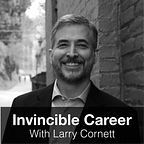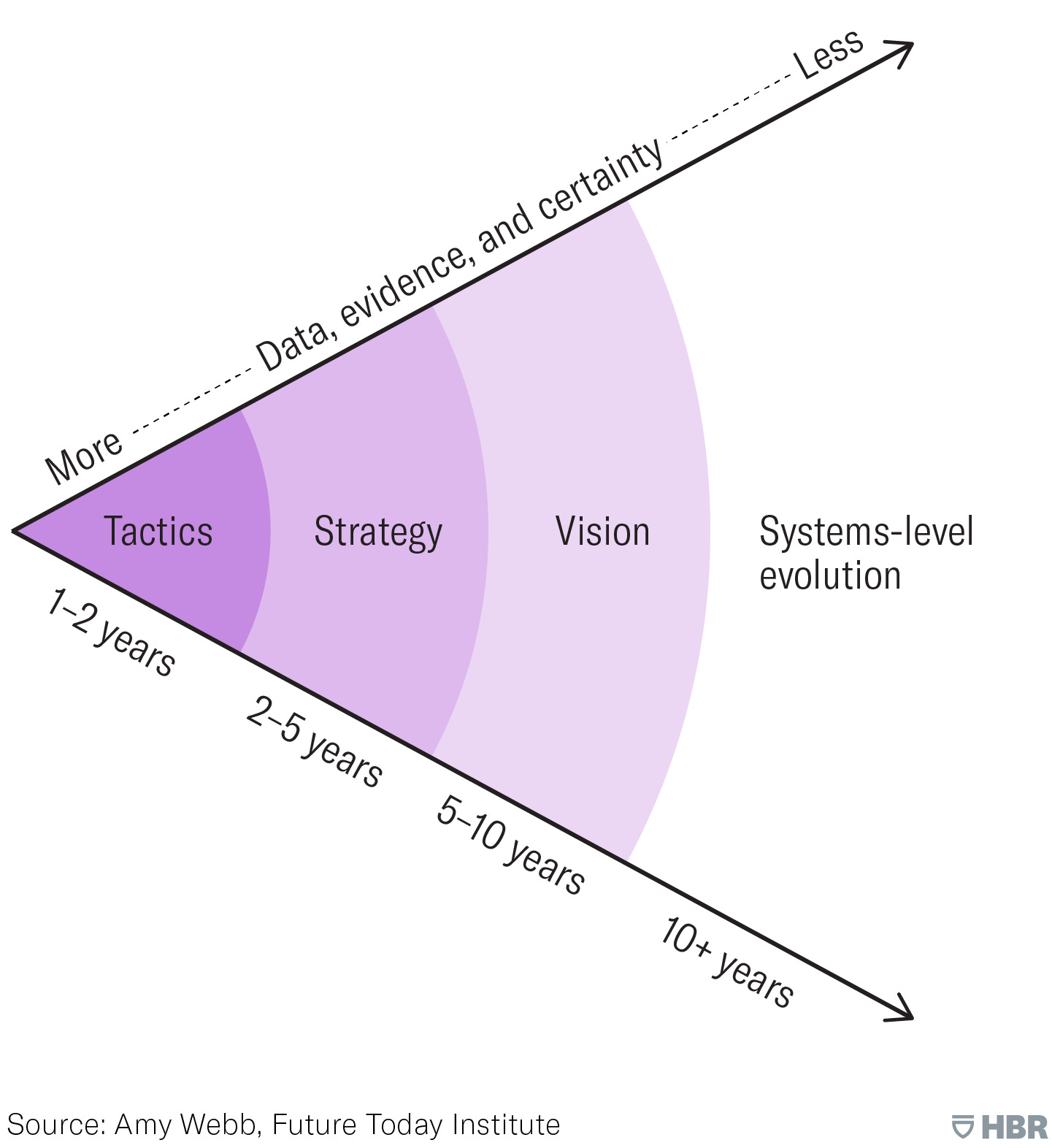
NOTE: I apologize for the chainsaw sounds in the background. The crew picked an amazing time to endlessly cut trees outside. 😫
I recently read Reid Hoffmann's article, Why 10 Year Plans are Wrong. In it, he states:
”You will change. The environment around you will change. And your allies and competitors will change.”
I agree with what he is saying about planning. Of course, career plans will need to change. A 10-year plan is a bit silly because the world does change so much in a decade.
Who could have predicted the impact of the pandemic?
Who could have foreseen the massive disruption smartphones would have on our personal and professional lives?
Who envisioned all of the novel opportunities enabled and created by online platforms?
Strategies and plans will always need to adapt to the changing times. But, if you created your long-term vision the right way, it shouldn’t keep changing. It should endure and stand the test of time.
So, don't get distracted by the shiny objects screaming for your attention today. Surface-level trends come and go. If you try to predict the ripples on the surface, you will fail.
That hot new profession today may be gone tomorrow. The booming new industry everyone is talking about may go cold next year. The startup darling that all of the investors are pumping may fizzle soon (e.g., Clubhouse).
Focus on the core truths of the human condition, if you want to choose a professional path that will endure. Dive deeper and deeper still. What have people always wanted and will always need (until we evolve beyond carbon-based lifeforms)?
Let’s use the entertainment industry as an example. What evolution have we witnessed?
Stories told around a fire at night.
Live plays enjoyed in the village square.
Theater performances on stage.
Films projected on screens in movie theaters.
VHS tapes, Laserdiscs, and DVDs watched in the comfort of your home.
Cable television pay-per-view.
Netflix delivered DVDs to your home.
And now, an explosion of streaming video, gaming, and other entertainment experiences is consumed on tiny computers in the palm of your hand.
If you try to predict what's coming next, you might be correct, but you might be so very wrong. If you try to plan a 10-year career and place a bet on where it's all heading, you might win or lose.
That's why Reid is correct about the fallacy of concrete 10-year plans. You can't predict the future with enough accuracy for planning that far into the distant years ahead.
However, you can return to the core truth that human beings enjoy being entertained. Our brains are large enough (and our modern world is safe enough) that we can frequently focus our minds and senses on fun instead of survival. In some way, shape, or form, people will still want to be entertained — and distracted from reality — ten years from now, 100 years from now, and probably for the rest of your professional career.
So, if you tell me that your long-term career goal is to be an executive at Netflix, I will caution you against that decision. For all we know, Netflix could implode in the next five years (e.g., a competitor might kill them just like they killed Blockbuster).
Heck, I will say that you're making a mistake even if you tell me that your long-term goal is to be a leader in streaming video. Sure, it seems like it's not going anywhere. But, we said the same thing about many technologies that have gone to the high-tech graveyard in the past 20 years.
However, if you want to create a long-term goal of climbing to a leadership role or founding a startup in the business of entertainment, I say go for it! People will always want to be entertained. Just be ready to adapt to the changing “how” of how entertainment will be provided.
The future is unpredictable
Companies often make the mistake of trying to brainstorm and engage in long-term planning to “create the future.” The reality of uncertainty and chaos makes leaders and shareholders very uncomfortable.
As Amy Webb said in an HBR article about strategic planning like a futurist:
“Nice, linear timelines offer a certain amount of assurance: that events can be preordained, chaos can be contained, and success can be plotted and guaranteed.”
Unfortunately, no amount of vision work or planning can control the future. Outside forces collide with the best-laid plans and wreak havoc on expected outcomes (e.g., natural disasters, pandemics, wars, competitive moves). That’s why so many organizations get into a pattern of cycling between strategy and tactics repeatedly and churn their teams.
Individuals fall into this trap, as well. I’m just as guilty. I enjoy long-term planning and vision work. But, we can’t predict precisely how our futures will turn out.
“Man Plans, and God Laughs.”
— Yiddish proverb
As a quantitative futurist, Amy Webb suggests a different framework for strategically thinking about the future. Her timelines aren’t lines — they’re “time cones.” The image below illustrates her framework.
The tip of the cone lives in the here and now, and tactics come into play because we have the highest degree of certainty, data, and evidence. But, as the cone moves to the right with more time (5 years, 10 years, and further out), it expands more broadly, and details are fuzzier. Outcomes and destinations are less precise and could fall within a broader range of possibilities. Your longer-term vision and strategies become much more useful than tactics.
What’s also interesting about her model is that the cone moves. It is not the fixed timeline that most planning exercises use.
“Unlike a traditional timeline with rigid dates and check-ins, the cone always moves forward. As you gain data and evidence and as you make progress on your actions, the beginning of the cone and your tactical category is always reset in the present day. The result, ideally, is a flexible organization that is positioned to continually iterate and respond to external developments.”
— Amy Webb, How to Do Strategic Planning Like a Futurist
Control, influence, or adapt?
This topic of long-term goals and trying to plan your future reminds me of the concept of “Locus of control,” which was created by the psychologist Julian Rotter. Your life is full of actions you take, actions others take, events in the world around you, and outcomes.
If you have a greater external locus of control, you tend to place the power over outcomes in the hands of others, luck or fate, or other “powers that be.” You say things like:
“I just got lucky.”
“He was in the right place at the right time.”
“I can’t do anything about it. What will be, will be.”
“I received a bad grade because the teacher doesn’t like me.”
“The boss only promotes her favorite employees.”
If you have a greater internal locus of control, you believe your actions determine or influence outcomes. You say things like:
“I worked really hard to get where I am.”
“He received that award because he’s super smart and talented.”
“I know that I control my destiny.”
“I received a bad grade because I didn’t study enough for the test.”
“The boss promotes people who get results.”
Of course, this concept isn’t black and white. Most of us have a belief system somewhere along a continuum. We either tend to think we are more in control of the outcomes in our lives or those outcomes are more out of our hands. Interestingly, people with a greater external locus of control have higher levels of depression and anxiety. They feel like nothing they do matters.
A pure internal locus of control isn’t so great, either. If you do that, you blame yourself completely for every failure. The reality is that it is a balance.
Yes, you can take action and shape outcomes. But, other people and the world around you will have a significant impact on outcomes too. And, people who are more balanced in how they think about external vs. internal control report being happier (April, Dharani, & Peters, 2012).
I've coached several people who told me that their career "just happened to them." They took the jobs that came their way, but they never intentionally pursued what they wanted. At some point, that approach failed them, they had a bad experience, or their career stalled.
However, when they shifted their locus of control more internally, they decided that they could control the path of their careers. They could intentionally decide how to prepare and position themselves. They knew they could influence the outcome. They ended up in a much better place.
I created a worksheet (available below) that is a useful way to examine a situation you might be facing that feels out of your control. It can help shift your locus of control away from external forces and reduce feelings of helplessness. The exercise challenges you to identify what you actually can control, what you might be able to influence, and what you probably have to accept.
The downloadable worksheet is free for the first 1,000 people who claim it. Grab yours today!
"Do you remember who you were, before the world told you who you should be?"
— Charles Bukowski
Your heart is stable
People don't change. We mature, evolve, learn, and grow. But, we don't fundamentally change.
I've observed that truism in my children as I've watched them grow up from babies to young adults. I still see the core of their personalities, likes, and dislikes despite the other changes in their lives.
I've seen it in myself. I've watched my life come almost full circle. Sure, my career has transformed — often radically — about every ten years.
Blue-collar work
Academic pursuits to receive my Ph.D.
Software design
Management and leadership
Startup life
Building my own business
Coaching
And who knows what will come next?
However, what has remained surprisingly stable and accurate is my ideal vision for my life. That has lasted more than 50 years.
I got sidetracked along the way and distracted by false goals, but I'm finally returning to that vision of what I always wanted. I'm slowly but surely finding my way there (and have never been happier).
What's always been true:
I'm an introvert who prefers mainly working alone.
I'm a creator who brings what's in my head to life with words, art, and music.
I wither when I'm trapped in the concrete world of cities.
I thrive when I'm in the mountains, deep in the woods, and away from crowds.
It took most of my life, but I've come full circle to what my heart always wanted. So, sure, a 10-year rigid career plan is ridiculous. Who knows what the world will be like and what you'll have to do to survive?
But, having a lifetime vision, mission, sense of purpose, and meaning? Yes. Yes, that is possible. I think it’s so important that I dedicated a chapter in my book to it.
Will you learn more about yourself and course correct over the years? Yes, I’m sure you will.
But, without a vision and a sense of purpose, what are you? A tiny boat on the surface of a stormy sea being thrust wherever the winds of fate blow you?
That's surviving, not thriving. It's ok for the short term but pretty miserable as a lifelong lifestyle.
Yes, be agile with your tactics in the near term. Be flexible with your strategy for the next few years. But, don’t be afraid to create an enduring and inspirational long-term vision for your life.
”And most important, have the courage to follow your heart and intuition. They somehow already know what you truly want to become. Everything else is secondary.”
— Steve Jobs
By the way, there is a great way you can support my work without spending any money on a premium subscription:
📣 Recommending my newsletter on social media!
It only takes a few seconds, and it helps grow my business so I can continue making time to write it.
I’ll even provide some copy and paste text to make it easy to share on Twitter, Reddit, LinkedIn, Facebook, etc. Thanks in advance!
I've really been enjoying the Invincible Career newsletter by Larry Cornett (@cornett). If you want to get ahead at work and be happier in your job, but you aren’t subscribed yet, you’re missing out.
https://newsletter.invinciblecareer.com
Larry Cornett is a leadership coach and business advisor who hosts a private mastermind community for ambitious professionals with weekly challenges, office hours, and confidential support. If you’re interested in starting your own business or side hustle someday (or accelerating an existing one), check out his “Employee to Solopreneur” course (launching later this year).
Larry lives in Northern California near Lake Tahoe with his wife and children, and a gigantic Great Dane. He does his best to share advice to help others take complete control of their work and life. He’s also on Twitter @cornett.













